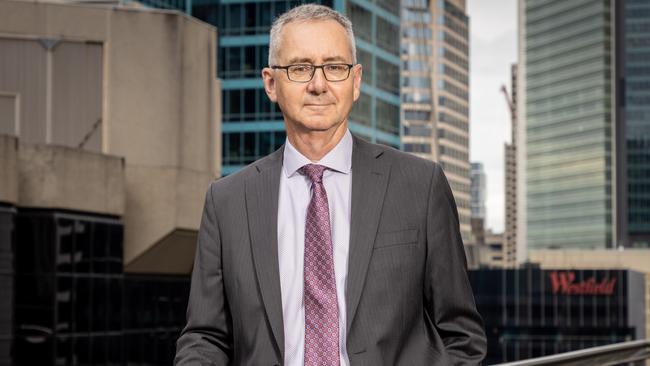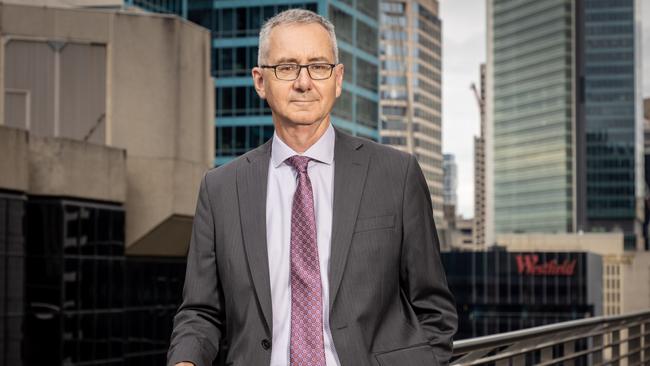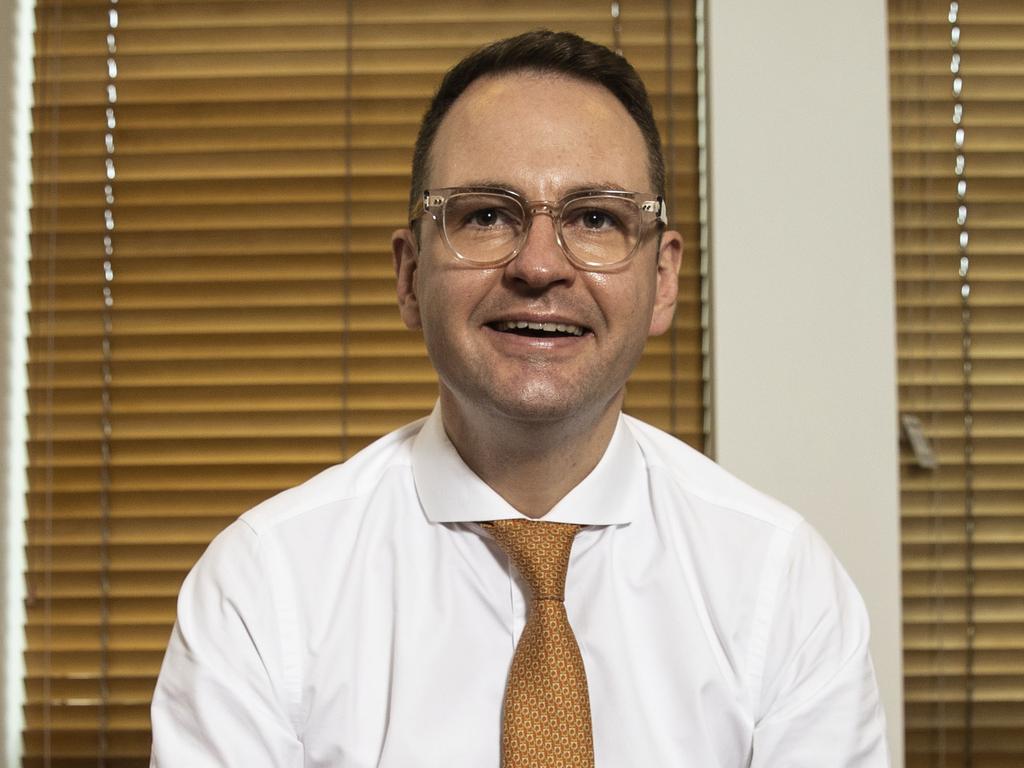APRA watching for ‘bank deposit risks’, says chairman John Lonsdale
The regulator will step up scrutiny of bank deposits for potential concentration risks, in the wake of the collapse of the Silicon Valley Bank, chairman John Lonsdale warns.

The Australian Prudential Regulation Authority is set to step up scrutiny of bank deposits for potential concentration risks of exposure to particular industries, in the wake of the collapse of the Silicon Valley Bank, chairman John Lonsdale has warned.
At a speech in Sydney on Tuesday, Mr Lonsdale said APRA was taking a closer look at potential concentration risks in deposits to specific industries as part of its response to recent global banking crises.
Mr Lonsdale said the Australian banking system was “among the best equipped in the world” to withstand a financial crisis.
But he said the collapse of SVB, which was heavily exposed to the US tech sector which suffered as interest rates rose last year, was a reminder of the speed at which money could be moved around the world in response to a crisis in another country.
Mr Lonsdale said it was also a reminder of the potential dangers of bank overexposure to a particular industry or demographic.
“As the speed of crises has accelerated, regulators have less time to respond than they once did,” he said.
“We can no longer expect to have days or weeks to debate and plan considered responses.”
“We need to be ready to act quickly, but we also need greater confidence than ever in the prudential safeguards we have in place.”
Mr Lonsdale said the current system of electronic banking meant that “entire deposits” could be quickly transferred around the world at the click of a button.
“It maybe we need to look more closely at concentration risks in deposits, and adjust requirements where an approved deposit institution has a particularly high exposure to a particular industry or demographic,” he said.
“These types of contemplations are already underway among international regulators.”
Mr Lonsdale said APRA had been in close contact with global banking regulators in response to the crises, particularly the collapse of SVB, as regulators around the world were looking at seeing whether more needed to be done to strengthen the regulatory framework.
He said this had included late night calls with members of the Basel banking community and the Financial Stability Board.
“They’ve been very useful forums in understanding what others are doing, learning lessons, and really getting in front of any issues,” he said.
“There’s bilateral issues going on between APRA and other peer regulators as well.”
Mr Lonsdale said the Council of Financial Regulators in Australia was “very busy”, with deputies of the regulatory agencies from the group meeting “several times a week, swapping notes, and triangulating”.
“We have requested more information from the banks,” he said.
“What I’m signalling is there’s a lot of work globally and domestically.”

Mr Lonsdale said that APRA’s prudential requirements for Australian banks exceeded international requirements in some cases, such as interest rate risk.
He said a recent stress test undertaken by APRA on Australia’s 10 largest banks, looking at the potential case of a prolonged global economic downturn and a 400 basis point rise in local interest rates, showed that the capital of the banks would still have been above the minimum levels, funding and liquidity positions remained safe and deposits were protected.
“The differences between the regulatory requirements for Australian banks and many overseas jurisdictions gives us confidence that the banking system here is among the best equipped in the world to handle a crisis,” he said.
Mr Lonsdale said the results of the stress test also gave APRA confidence in the Australian system.
But he said that Australian banks were not immune from the impact of global events, such as the collapse of Silicon Valley Bank in the US or Credit Suisse in Europe.
“As a mid-sized economy, with a population of only 26 million, our banks depend on access to international markets to meet their wholesale funding and capital needs,” he said.
“No matter how resilient our financial system, what happens globally affects us to a greater or lesser extent.”
But said Australian financial institutions, including banks, insurance companies and super funds, did need to “raise the bar” in their preparedness to deal with cyber attacks.
Mr Lonsdale said an analysis of recent responses from financial institutions to questions from APRA showed that they had “more work to do” in preparing themselves for cyber risks.
He said there was a “lack of rigour in the nature and frequency of security control testing” and insufficient oversight by boards on ensuring cyber resilience in their organisations.
Australian banks were “very focused on the threat of cyber attacks and were working hard on their defences and responses in the event of an attack”, Mr Lonsdale said.
But he said the threat from cyber attacks was “constantly evolving.”
He said APRA had asked banks, insurance companies and superannuation funds to conduct “tripartite” reviews to examine how well they had implemented new prudential standards on cyber risks.
“Given recent cyber breaches affecting a broad number of Australians, boosting cyber resilience remains one of APRA’s top priorities,” he said.
“Yet our analysis of the first tranche of results (from a review of their cyber resilience) shows that entities have more work to do and there is a need to continuously raise the bar on cyber preparedness and resilience across banking, insurance and superannuation.”
Speaking earlier, Assistant Treasury and Financial Services Minister Stephen Jones, said the government was keenly aware of the “turbulent time” financial systems overseas.
“I’ve seen some strains on our funding markets, our domestic funding market continues to function very well,” he said.
“Australia’s financial system is well-equipped to deal with the disruptions and challenges in the global economy.”
But Mr Jones warned the government would “to monitor the situation and update Australians on any significant developments”.
His comments come as Federal Treasurer Jim Chalmers is set to convene a meeting of the Council of Financial Regulators on Thursday to monitor the situation.
This follows discussions in recent days with US Treasury Secretary Janet Yellen and Christine Lagarde, president of the European Central Bank, about the banking system in Europe and America, volatility in the global financial system, and the impact of higher interest rates around the world.
Mr Chalmers, who has also been in regular contact with executives from the big four banks in the wake of the SVB collapse and other events, said it was clear from his discussions that “international authorities are prepared to do what’s necessary to reassure markets at a time of uncertainty and volatility.”
He said co-ordinated action by central banks and international financial authorities had “helped ease some of the concerns in global funding markets.”
But he said they remained “vigilant.”
He said volatility in the financial system was still “contributing to uncertainty more generally in the global economic outlook.”
“We’re not immune to what’s coming at us from overseas, but our own economy and financial system are well-regulated, well-capitalised and well-placed to respond to these challenges,” he said.
He said he had been “closely engaging with our regulators, who advise our own institutions are in a good position to withstand the pressures coming at us from around the world.”






To join the conversation, please log in. Don't have an account? Register
Join the conversation, you are commenting as Logout